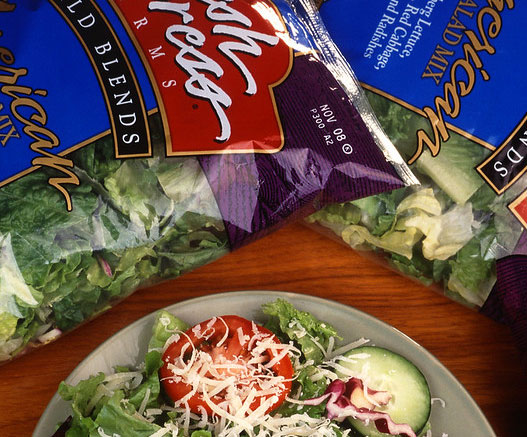
Between 1998 and 2019, 36 outbreaks of E. coli were reported related to romaine lettuce in bagged salads.
Salad Safety: K-State food scientist shares tips on caring for packaged greens
Blakeslee notes rise in E. coli outbreaks related to bagged salads
Oct. 20, 2022
By Maddy Rohr, K-State Research and Extension news service
MANHATTAN, Kan. — Salads make a nutritious meal or an easy addition of green color into the daily diet, and can be found at almost any restaurant or grocery store.
But Kansas State University food scientist Karen Blakeslee said consumers also know packaged lettuce for E. coli outbreaks and a cause of foodborne illness.
“Between 1998 and 2019, 36 outbreaks have occurred linked to mostly romaine lettuce,” said, Blakeslee, who is also coordinator of K-State’s Rapid Response Center for food science.
According to a recent USDA study, E. Coli was more likely to be found on lettuce harvested in the fall than on lettuce harvested in the late spring. Overall bacterial contamination, E. Coli survival rate, and lettuce deterioration varied by season.
Blakeslee encourages consumers to:
- Always look at the package expiration date.
- Keep packages away from raw meats to prevent cross-contamination.
- Check packages for any damage or produce that doesn’t look fresh.
- Store salad greens in the refrigerator in the crisper drawer.
Although romaine lettuce is more commonly linked to E. coli outbreaks, it hasn’t impacted domestic consumption.
“According to a report from Colorado State University, romaine lettuce accounts for 30% of the lettuce consumed in the U.S.,” Blakeslee said. “From 1990 to 2009, consumption increased from 1.2 to 7.7 pounds per person. In 2017, the consumption of romaine and leaf lettuce increased to 12.5 pounds per person.”
She said darker greens have more nutritional benefits, while leafy greens are overall a great low-calorie food with fiber, folate and vitamins.
“Because most leafy greens are grown near the ground, it is important to rinse fresh produce under running water before consumption,” Blakeslee said. “It is best to rinse leafy greens just before use and rub leaves with your fingers to remove visible contamination.”
Blakeslee publishes a monthly newsletter called You Asked It! that provides numerous tips on being safe and healthy. More information is also available from local extension offices in Kansas.

